Science
Intent
Greave Primary School recognises and values the importance of science and scientific enquiry. Science at Greave aims to develop a fun, practical and engaging high-quality curriculum that inspires the next generation to succeed and excel in science. We do this through fully adhering to the aims of the national curriculum and fostering a healthy curiosity and interest in the sciences. At the heart of our progressive science curriculum is scientific investigation. Wherever possible we intend to deliver lessons where children learn through varied systematic investigations, leading to them being equipped for life to ask and answer scientific questions about the world around them. We believe science encompasses the acquisition of knowledge, concepts, skills and positive attitudes. Throughout the programmes of study, the children will acquire and develop the key knowledge that has been identified within each unit and across each year group, as well as the application of scientific skills. We ensure that the Working Scientifically skills are built-on and developed throughout children’s time at the school so that they can apply their knowledge of science when using equipment, conducting experiments and investigation, building arguments and explaining concepts confidently, being familiar with scientific terminology and, most importantly, to continue to ask questions and be curious about their surroundings.
Implementation
We aim to do this by:
- At Greave, we cover the objectives set out in the Programme of Study in the National Curriculum.
- Using skills wheels (working scientifically skills) in every lesson to help the children recognise which skills they are using, ensuring that prior skills are built on.
- Early years will be introduced to their own skills wheel, which will be displayed within the classroom and referred to when learning through continuous provision.
- At least one hands on, practical investigation per topic.
- Teachers to teach children ‘how’ to carry out practical procedures.
- Providing children with opportunities to answer questions using different types of enquiry (fair test, identifying and classifying, using secondary sources, patterns, observing over time).
- Having whole school Science enrichment days to provide children with active, first hand experiences to ensure that learning is memorable and enjoyable.
- Knowledge organisers are used to check existing knowledge at the beginning of each topic to ensure teaching is informed by the children’s starting points and at the end of the topic to see what they have learnt.
- Children will have access to key scientific vocabulary for each sceince unit. Vocabulary is progressive though the school and children are encourage to use correct scientific vocabulary.
- Use the outside environment to support hands on learning.
Impact
- We will see our children retain knowledge that is pertinent to science with a real life context. They will be able to question ideas and reflect on knowledge. Children will work collaboratively and practically to investigate and experiment. Children will be able to explain the process they have taken and be able to reason scientifically.
- Unit overviews will show progression of key skills through and beyond each year group.
- Pupil voice will show growing understanding and engagement.
- Celebrations of children’s work on display around school, which children understand and are proud of. This will show clear progress through school.
Science Subject Overviews
Progression of Skills
Click here for the Progression of Science KS1 & KS2 document
Science in EYFS
Science in the EYFS is covered in the ‘Understanding of the World’ aspect of the curriculum.
Understanding of the World involves guiding children to make sense of their physical world and their community through exploration, observation and investigation of people, places, technology, and the environment. Children are given many opportunities to explore their indoor and outdoor environments, and are supported in asking questions, making observations, noticing patterns and change and answering some simple questions through first-hand experiences.
Click here for the Progression of Science in EYFS document

See what we've been getting up to in Science
Pictures coming soon...






